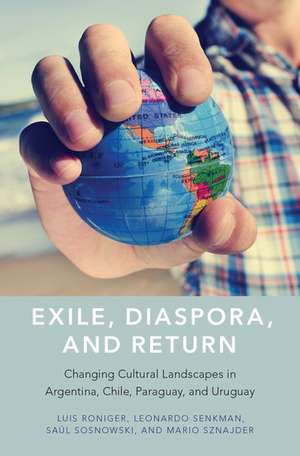Exile, Diaspora, and Return: Changing Cultural Landscapes in Argentina, Chile, Paraguay, and Uruguay
Autor Luis Roniger, Leonardo Senkman, Saúl Sosnowski, Mario Sznajderen Limba Engleză Hardback – 28 dec 2017
Preț: 499.79 lei
Preț vechi: 714.88 lei
-30% Nou
Puncte Express: 750
Preț estimativ în valută:
95.63€ • 104.21$ • 80.59£
95.63€ • 104.21$ • 80.59£
Carte tipărită la comandă
Livrare economică 12-18 aprilie
Preluare comenzi: 021 569.72.76
Specificații
ISBN-13: 9780190693961
ISBN-10: 0190693967
Pagini: 306
Dimensiuni: 239 x 160 x 25 mm
Greutate: 0.56 kg
Editura: Oxford University Press
Colecția OUP USA
Locul publicării:New York, United States
ISBN-10: 0190693967
Pagini: 306
Dimensiuni: 239 x 160 x 25 mm
Greutate: 0.56 kg
Editura: Oxford University Press
Colecția OUP USA
Locul publicării:New York, United States
Recenzii
The authors focus on the policies of deterritorialization, analyzing what they call "the dynamic of mobilization of the diaspora" and the "politics of return," as well as the transformational effect that the exiled had on the redemocratization process. This book constitutes an essential contribution to comparative analyses of these four countries and brings together the humanities, political sciences, history, and sociology ... When considering current debates on migration and displacement, this book becomes even more relevant, as it invites the reader to rethink Latin American exiles and their diasporas, bridges, and networks.
Notă biografică
Luis Roniger is Reynolds Professor of Latin American Studies and of Politics and International Affairs at Wake Forest University.Leonardo Senkman is Research Fellow at the Harry Truman Institute for the Advancement of Peace and Director of the International Center for University Teaching of the Jewish Civilization at the Hebrew University of Jerusalem, Israel.Saúl Sosnowski is Professor of Latin American Literature and Culture at the University of Maryland at College Park.Mario Sznajder is Professor Emeritus and Leon Blum Chair of Political Science at the Hebrew University of Jerusalem, Israel.
